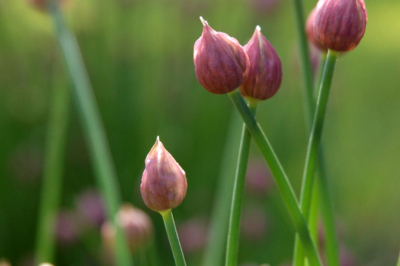Most people use only the fresh stalks of chives and throw away buds and flowers. However, you should not do that, because the flowers are not only edible, their buds can also be wonderfully pickled as a substitute for capers.

Chive flower capers
To pickle chive buds, use only buds that are still tightly closed and clean. If possible, pick them in the early morning, because at this time the content of essential oils is the highest – the more aromatic will be your false capers. And this is how to prepare the flower capers:
- Take a jam jar with a screw top and rinse it thoroughly with boiling water.
- You can fit about 50 grams of chive buds in a commercial jar.
- Fill the buds into the dried jar.
- Add fresh herbs according to your taste. For example, tarragon, thyme and rosemary sprigs fit perfectly.
- Boil a decoction of about 200 milliliters of good apple, white or red wine vinegar, 10 grams each of salt and sugar, some finely chopped garlic and half a teaspoon each of mustard and peppercorns.
- Pour the hot brew into the prepared jars.
- Leave as little air as possible.
- Immediately seal the jars and turn them upside down.
- Leave the false capers to infuse in a dark and dry place for at least four weeks.
What do the false capers taste like?
False capers can be used in exactly the same way as real capers and are delicious in numerous savory dishes with fish, meat or cheese, but also with pasta or in salads. The freshly harvested chive blossoms can be used to decorate dishes or as a substitute for chive stalks – they have a very intense, chive-typical aroma, which is both sharper and sweeter (thanks to the nectar they contain) than that of the stalks.
Tips & Tricks
Not only chive buds taste delicious with cheese, fish, meat or pasta dishes, you can also pickle other buds of edible flowers as in the way described. For example, the buds of wild herbs such as daisies, dandelions or wild garlic are perfect, as well as the buds of nasturtiums and elderflowers. However, it is important to collect only clean and healthy buds – ergo not necessarily from the roadside – and to process them as fresh as possible.

